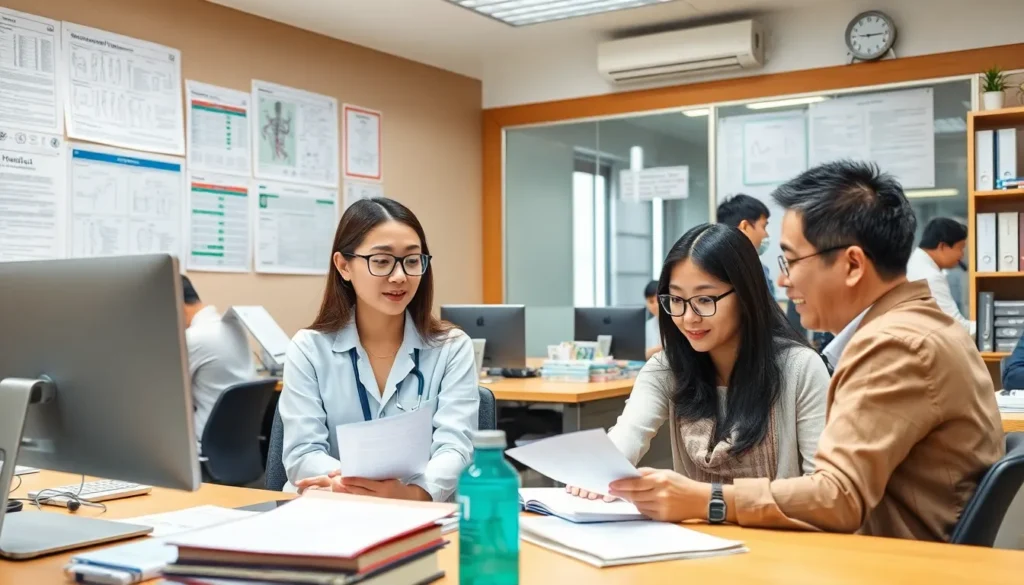Table of Contents
ToggleIn the bustling city of Taipei, the need for specialized translation services has surged, particularly in the medical field. As healthcare professionals strive to share vital research and findings across language barriers, the demand for accurate and nuanced translations of medical papers has never been greater. Translating medical literature requires not just linguistic skills but also a deep understanding of medical terminology and context.
Translation agencies in Taipei are stepping up to meet this challenge, offering tailored services that ensure clarity and precision in every document. With the right expertise, these agencies help bridge the gap between researchers and practitioners, facilitating the exchange of knowledge that can ultimately improve patient care. As the global medical community continues to expand, the role of translation in disseminating critical information becomes increasingly vital.
Overview of Medical Translation Services in Taipei
Medical translation services in Taipei focus on the precise conversion of medical texts to ensure effective communication. These services include translating research papers, clinical trial documents, patient records, and consent forms. Accuracy is essential, as mistranslations can lead to serious consequences in patient care and research outcomes.
Translation agencies in Taipei employ professionals with strong backgrounds in both linguistics and medicine. These experts understand medical terminology and practices, enabling them to translate complex concepts accurately. They often work with specialists in various medical fields to maintain relevance and precision.
Moreover, many agencies utilize advanced technology, such as Computer-Assisted Translation (CAT) tools, which enhance the efficiency and consistency of translations. By leveraging these technologies, agencies can provide quicker turnaround times without compromising quality.
The regulatory landscape also plays a significant role in medical translation. Adherence to local and international guidelines is crucial, especially for documents intended for submission to medical journals or regulatory bodies. Agencies ensure that translations comply with the necessary regulations, which aids in facilitating communication between healthcare providers and patients across language barriers.
Overall, the growing demand for medical translation services in Taipei highlights the critical role these organizations play in promoting global collaboration in healthcare and enhancing patient outcomes.
Importance of Accurate Medical Translation


Accurate medical translation serves as a vital link between medical professionals and patients, promoting effective communication within the healthcare system. This accuracy directly impacts health outcomes, underscoring the necessity for expert translation services.
Impact on Healthcare
Accurate medical translation directly influences healthcare delivery by ensuring clarity and understanding among professionals and patients. Effective translations of research papers and clinical data enable doctors to access the latest findings, which facilitate informed decision-making. Studies published in various languages gain international visibility, allowing for collaborative research efforts. Furthermore, clear translations of patient information significantly enhance the quality of care, as patients can better understand treatment plans and procedures.
Patient Safety Considerations
Patient safety plays a fundamental role in medical translation. Mistranslations can lead to medication errors, misdiagnoses, or inappropriate treatments, posing significant risks to patient health. Precise translation of consent forms and patient records ensures that patients understand their rights and obligations. Additionally, professionals trained in medical translation are essential for conveying complex medical terms accurately, thereby minimizing the chances of misunderstandings that could compromise patient safety. High-quality translations support compliance with care standards, ultimately leading to better patient outcomes.
Key Players in Taipei’s Medical Translation Industry
The medical translation industry in Taipei consists of various agencies and freelance professionals dedicated to providing precise translation services. These key players contribute significantly to the accuracy and efficiency of medical communication.
Notable Translation Agencies
Numerous translation agencies operate within Taipei, specializing in medical translation services.
- XYZ Translators: A prominent agency recognized for its focus on medical research translation. It employs linguists with medical backgrounds to enhance the integrity of scientific texts.
- ABC Translation Services: This agency offers comprehensive medical translation solutions, including clinical trial documentation and patient safety literature. It utilizes CAT tools to maintain consistency across projects.
- HealthTranslate: Known for its attention to regulatory compliance, this agency specializes in translating documents for international publishing. Their translators possess expertise in both language and regulatory requirements.
These agencies use advanced technology and maintain high standards for quality assurance. Their collaborations with medical professionals ensure reliable translations, helping to mitigate risks associated with miscommunication in healthcare settings.
Freelance Translators
Freelance translators also play a vital role in Taipei’s medical translation scene.
- Certified Freelancers: Many medical translators possess certification in both translation and medical terminology. This certification validates their competence and understanding of complex medical concepts.
- Specialized Experts: Freelancers often focus on niche areas within medicine, such as pharmacology or oncology. Their specialized knowledge enhances the quality of translations in specific research studies.
- Flexible Availability: Freelance translators typically offer flexible services, accommodating urgent translation needs. This adaptability supports time-sensitive projects, particularly in clinical settings.
Freelance medical translators often collaborate with agencies to meet larger project demands, thereby expanding their reach and enhancing service offerings. Their contributions are crucial for providing high-quality translations that support effective communication in healthcare.
Challenges Faced in Medical Translation
Medical translation presents several challenges, particularly in language nuances, terminology, and cultural sensitivity. These factors directly impact the accuracy and effectiveness of translations within the medical field.
Language Nuances and Terminology
Language nuances represent significant barriers in medical translation. He often encounters terms with multiple meanings, where context determines the accurate translation. Complexity increases for specialized medical jargon, which varies by region and discipline.
Translation professionals must possess deep knowledge of medical terminology, ensuring they capture precise meanings. For instance, terms like “stroke” can refer to different conditions based on context and language. Additionally, idiomatic expressions can lead to misunderstandings if translated literally. Therefore, experienced translators prioritize contextual accuracy to prevent any misinterpretation that could affect patient care.
Cultural Sensitivity
Cultural sensitivity plays a crucial role in medical translation. It encompasses the understanding of local customs, beliefs, and healthcare practices that influence patient interactions. He recognizes that health-related attitudes differ significantly across cultures.
Inaccurate translations may stem from cultural misunderstandings, resulting in mistrust or non-compliance among patients. For example, translation of consent forms must reflect not only legal language but also cultural viewpoints toward medical treatments. Professionals in medical translation must engage with cultural aspects to ensure effective communication and foster trust between healthcare providers and patients. Therefore, training in cultural competence becomes integral for translators working within the medical field.




